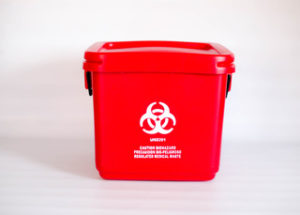The Value of Proper Waste Disposal Practices
From the effects of improper waste disposal on our atmosphere to the lasting ramifications for future generations, the significance of taking on sustainable waste monitoring practices can not be overemphasized. By checking out the ecological effect of careless waste disposal, the benefits of reusing initiatives, and the significance of community engagement in waste reduction initiatives, a deeper understanding of why correct waste disposal methods are critical emerges.
Ecological Influence of Improper Disposal
Improper disposal of waste presents a significant danger to the environment because of its detrimental effects on ecological communities and human health and wellness. When waste is not effectively handled, it can result in pollution of the soil, air, and water, triggering damage to different plant and pet varieties. click here. Chemicals and toxins from incorrectly disposed waste can permeate into the ground, polluting groundwater resources and impacting the wellness of both wildlife and people
Additionally, the build-up of waste in land fills creates greenhouse gases like methane, adding to environment change and international warming. Inappropriate disposal methods also result in littering, which not just breaks down the aesthetic value of the setting yet can additionally damage wild animals via intake or complication.
To mitigate these environmental effects, it is critical for individuals and areas to take on appropriate waste disposal methods such as reusing, composting, and responsible contaminated materials disposal. By taking these actions, we can assist shield ecological communities, maintain all-natural resources, and guard human health and wellness for future and present generations.
Advantages of Recycling Programs
On a regular basis taking part in recycling programs supplies numerous benefits for both the atmosphere and society in its entirety. One of the crucial advantages of recycling is the conservation of all-natural resources. By reusing materials such as paper, glass, metal, and plastic, less raw products require to be extracted from the earth, bring about lowered logging, mining, and boring activities. This preservation of resources not only aids in keeping environmental balance however also adds to sustainable growth.
Additionally, reusing plays an important function in decreasing energy consumption and greenhouse gas exhausts. The production of goods from recycled products usually requires much less power compared to manufacturing from virgin resources - medical waste removal. Therefore, the carbon impact connected with the manufacturing process is considerably decreased, helping in the fight versus environment change
Additionally, reusing programs develop work possibilities in the reusing sector, promoting economic growth and social well-being. By urging the recycling and reuse of products, these programs support a circular economic situation that minimizes waste generation and maximizes resource efficiency, eventually leading to a cleaner, greener future for generations to find.
Contaminated Materials Monitoring Guidelines
Implementing efficient contaminated materials administration guidelines is critical for decreasing ecological and wellness threats connected with the improper disposal of harmful products - click here. Proper handling, treatment, and disposal of contaminated materials are important to stop contamination of soil, water resources, and air
One key guideline is correct labeling of contaminated materials containers to make certain safe handling and transportation. Additionally, centers must stick to stringent storage space requirements to stop leakages, spills, or accidents that might jeopardize human wellness and the environment. Regular training programs for employees on hazardous waste management techniques are additionally essential to guarantee conformity with policies and advertise a culture of safety and security.
Additionally, harmful waste ought to be set apart based upon its homes to stop chemical responses that could lead to unsafe circumstances. Executing a comprehensive waste radar can assist keep track of the activity of harmful materials from generation to disposal, ensuring openness and responsibility. By following these standards faithfully, sectors and services can add to a safer and cleaner setting for future and present generations.
Community Involvement in Waste Decrease
To efficiently attend to the ecological and health and wellness dangers associated with contaminated materials management, engaging the neighborhood in waste reduction efforts is paramount. Neighborhood participation plays an important duty in promoting sustainable waste administration techniques and fostering a society of ecological responsibility. By informing homeowners about appropriate waste partition, recycling, and composting methods, areas can significantly lower the amount of waste sent out to land fills, thus minimizing environmental contamination and preserving natural deposits.
Area participation in waste reduction programs additionally assists in increasing recognition concerning the importance of waste minimization and motivates individuals to embrace environmentally friendly routines in their lives - medical waste disposal. Joint initiatives in between local authorities, waste management business, and neighborhood members can bring about the implementation of efficient waste decrease approaches tailored to the details requirements of each area or town
Additionally, area interaction fosters a sense of possession and responsibility amongst residents, equipping them to take aggressive steps towards minimizing waste generation and promoting a cleaner, much healthier environment for future and current generations. By interacting in the direction of common waste decrease goals, neighborhoods can make a significant influence on mitigating the adverse results of inappropriate waste disposal practices.

Future of Sustainable Waste Practices
Typical waste disposal methods, such as landfilling and incineration, are no much longer lasting in the lengthy term due to their significant environmental effects. Relocating onward, the future of sustainable waste additional hints practices exists in embracing a circular economy technique, where resources are reused, reused, or repurposed to reduce waste generation.
Technical technologies play a crucial duty in shaping the future of lasting waste practices. Advanced waste sorting and reusing technologies can help improve the performance of waste management procedures, permitting for the recovery of valuable resources from waste streams. Furthermore, the fostering of eco-friendly products and composting approaches can help in reducing the quantity of organic waste finishing up in land fills, thereby mitigating greenhouse gas emissions.
Additionally, promoting consumer awareness and education and learning on correct waste segregation and disposal techniques is important for driving behavioral change towards sustainability. By promoting a society of waste recycling, decrease, and reuse, communities can jointly add to a cleaner and much healthier environment for future generations.

Final Thought
To conclude, proper garbage disposal practices are vital for minimizing ecological impact and promoting sustainability. By applying recycling programs, handling hazardous waste appropriately, and motivating neighborhood participation in waste decrease efforts, we can work towards a cleaner and much healthier environment. It is crucial for organizations, individuals, and governments to prioritize sustainable waste methods for the future health of our planet.
.jpg)
From the consequences of improper waste disposal on our atmosphere to the long-lasting effects for future generations, the importance of embracing lasting waste monitoring practices can not be overstated. By exploring the environmental effect of irresponsible waste disposal, the benefits of reusing initiatives, and the relevance of area interaction in waste reduction efforts, a much deeper understanding of why proper waste disposal practices are important emerges.
By informing residents regarding appropriate waste partition, recycling, and composting methods, neighborhoods can substantially lower the quantity of waste sent out to land fills, therefore minimizing environmental pollution and conserving natural resources. (click here)
Relocating onward, the future of lasting waste methods exists in accepting a circular economic situation technique, where resources are recycled, reused, or repurposed to lessen waste generation.
Advanced waste sorting and reusing innovations can aid improve the performance of waste administration procedures, enabling for the recuperation of valuable resources from waste streams.
 Anna Chlumsky Then & Now!
Anna Chlumsky Then & Now! Patrick Renna Then & Now!
Patrick Renna Then & Now! Burke Ramsey Then & Now!
Burke Ramsey Then & Now! Nancy Kerrigan Then & Now!
Nancy Kerrigan Then & Now! Jeri Ryan Then & Now!
Jeri Ryan Then & Now!